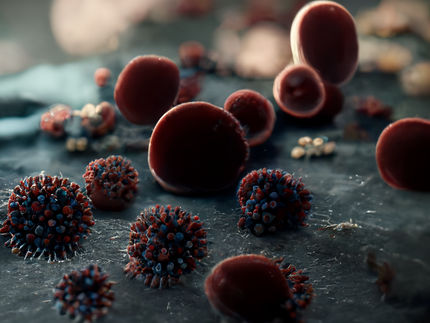Disgusting disease-related videos trigger immune response
Advertisement
People who are confronted with disease-related disgusting videos show an increased concentration of the antibody immunoglobulin A in their saliva. This is shown in a study by researchers from the Department of Biology at the University of Hamburg with 116 test subjects. The findings suggest that the physiological immune system, previously thought to be mainly reactive, responds even before a pathogen enters the body. The findings were published in the journal Brain, Behavior & Immunity - Health.

Among other things, subjects watched disgusting videos related to infectious respiratory diseases.
Pexels/Piacquadio
The behavioral immune system (BIS) supports the physiological immune system (PIS) in fighting infections and can even reduce the risk of infection by encouraging people to protect themselves from pathogens. For example, it helps detect cues of pathogens (such as odors or visible signs of illness) in the environment or triggers avoidance behaviors as well as feelings of aversion or disgust.
Previous studies have found evidence of possible interactions between the BIS and the PIS. However, most of these results could not be replicated. Scientists from the Department of Biology at the University of Hamburg have now conducted a study to gain further insights into the interactions of the two systems and the influence of disgust- and disease-related stimuli on immune responses. The changes were measured by the concentration of secretory immunoglobulin A (sIgA) in saliva.
To do this, the researchers had 116 subjects (47 male, 69 female) watch various disgust-inducing videos. Two of the videos showed situations associated with contagious respiratory viral infections. The third video did not contain a risk of contagion, but did contain situations that evoked disgust at their core, such as spoiled food, decaying animal carcasses, or cockroaches. A fourth video served as a control and showed landscape impressions. The researchers took saliva samples to measure the concentration of antibodies (sIgA) and had subjects fill out questionnaires about how they felt.
"It turned out that the sIgA concentration in test subjects increased after stimulation - especially in videos showing people with symptoms of disease," says Judith Keller, first author of the study and a doctoral student in the Neuroendocrinology group at the Department of Biology at the University of Hamburg. On average, sIgA levels increased by 83.15 percent after watching the disease video and by 44.79 percent after watching videos of spoiled food.
"This is particularly because the physiological immune system has previously been considered mainly reactive, meaning it is otherwise more likely to respond to a pathogen in the body. The increase in our study suggests that it also reacts before the pathogen enters the body," Keller said. So the researchers hypothesize that the BIS not only triggers psychological action, but in this case also stimulates a PIS response.
"However, we have to qualify that our study does not provide direct evidence for increased immunity in individuals," says junior professor Dr. Esther Diekhof, head of the Neuroendocrinology group at the Department of Biology at the University of Hamburg. "However, such a proactive defense mechanism seems likely, as sIgA in saliva plays an important role in immune exclusion."
Future studies need to further investigate whether this increase in sIgA actually triggers an immune response, reflecting increased immunity from, for example, respiratory viruses, even before the mucous membranes have come into contact with a pathogen.
Note: This article has been translated using a computer system without human intervention. LUMITOS offers these automatic translations to present a wider range of current news. Since this article has been translated with automatic translation, it is possible that it contains errors in vocabulary, syntax or grammar. The original article in German can be found here.
Original publication
Other news from the department science
Most read news
More news from our other portals
See the theme worlds for related content
Topic world Antibodies
Antibodies are specialized molecules of our immune system that can specifically recognize and neutralize pathogens or foreign substances. Antibody research in biotech and pharma has recognized this natural defense potential and is working intensively to make it therapeutically useful. From monoclonal antibodies used against cancer or autoimmune diseases to antibody-drug conjugates that specifically transport drugs to disease cells - the possibilities are enormous

Topic world Antibodies
Antibodies are specialized molecules of our immune system that can specifically recognize and neutralize pathogens or foreign substances. Antibody research in biotech and pharma has recognized this natural defense potential and is working intensively to make it therapeutically useful. From monoclonal antibodies used against cancer or autoimmune diseases to antibody-drug conjugates that specifically transport drugs to disease cells - the possibilities are enormous























































